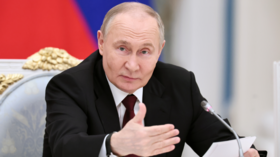Lawmakers to tidy up Russia’s pawnshops
Russia’s pawnbroking industry is set to receive an overhaul. The State Duma is in the process of tightening regulations to make the trade more transparent.
Across Russia there are more than 2,000 pawn-broking shops, serving around five million customers. Two million of these live in Moscow, where every year the industry turns over almost 400 million dollars.
If you've never had to visit a pawnbroker here’s how it works. Customers exchange valuables for ready cash. If and when their finances allow, they buy them back. The business sees hundreds of items cross the trading table every day.
“Here we specialize in fur but we also take jewellery, clothes, shoes and household appliances. We have a special refrigeration room, specifically designed for fur storage,” says Natalya Semyonova, MosGorLombard pawnshop senior manager.
Pawnbrokers attract all sorts of clients, from well-paid workers to students, pensioners and the unemployed. With minimal transaction costs and no hidden fees or strings attached, pawn broking offers its customers an important financial service. But there are possible downsides including high interest rates, and the risk of loosing the option to buy back your goods after contract expiry date.
The State Duma says the laws which currently regulate the industry are inadequate, with some even contradicting each other. With so much money at stake the government wants to see the regulations pulled together and made clearer and new rules introduced.
“At the moment the customer and broker agree on a selling price for an item, which can’t be changed after the contract is signed. The Duma wants to introduce a law whereby if an item is sold or auctioned at a higher price than the contract price, then the client gets to keep the difference. If they don’t return for the money, then it goes into the federal budget,” says Konstantin Shipunov, State Duma deputy.
MosGorLombard says it fully agrees with the government‘s attempts to tighten control but it admits there are some new laws which it doesn’t see as positive for either broker or client.
“The Duma intends to limit the length of time a person can pay back a short-term loan. But if someone needs, say one year to buy back say a family heirloom, then why should we rob them of this right?” wonders Svetlana Limberova, the company Deputy Director.
According to the Duma, Russia’s pawnbroking industry is on the decline, with smaller shops closing and larger ones consolidating. One idea for the future is to mirror that of banking, with customers able to deposit their goods in special machines in return for money. It's just one attempt to keep the business up-to-date and relevant with the new Russian consumerism.











